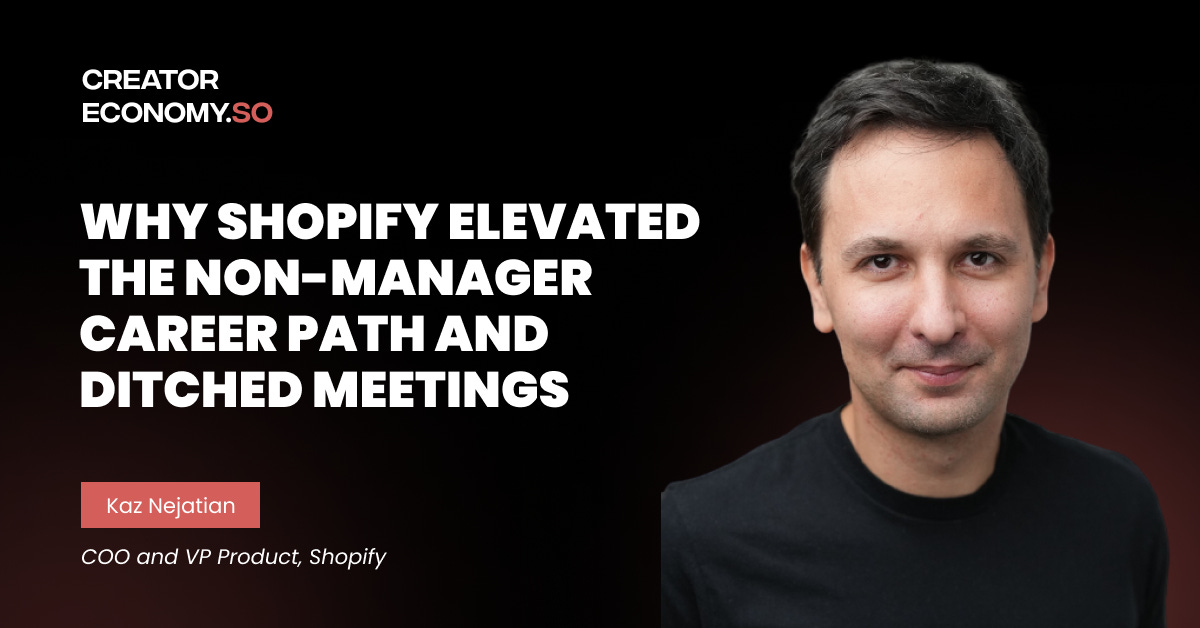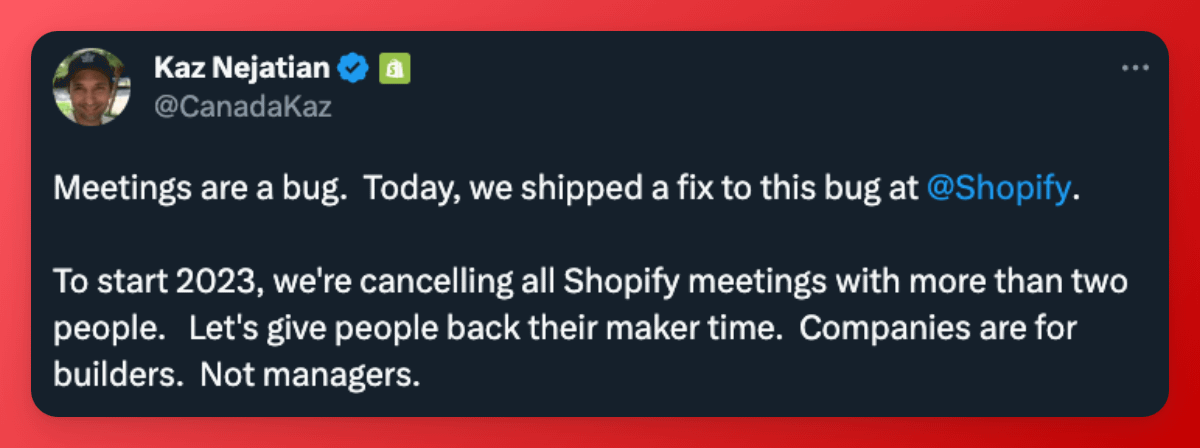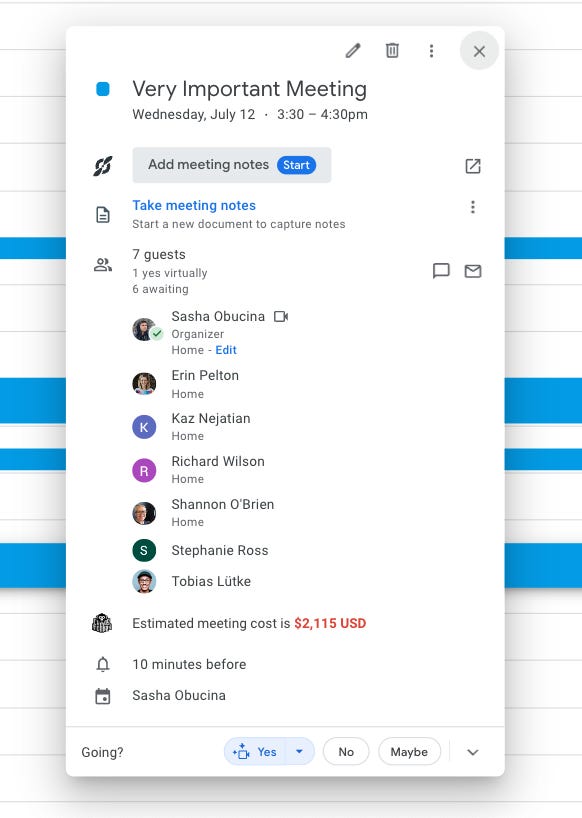Kaz Nejatian (COO, Shopify): Why Shopify Elevated the Non-Manager Career Path and Ditched Meetings
Kaz Nejatian (COO, Shopify): Why Shopify Elevated the Non-Manager Career Path and Ditched MeetingsThe difference between crafters and managers and how Shopify rages against meetings👋 If you enjoy this newsletter, please fill out this short 1-min survey. It’ll help me prioritize my content and find sponsors. Thank you! Dear subscribers, Today, I want to talk about how you can focus on product craft and avoid meeting bloat as your company scales.
Kaz Nejatian is the VP Product and COO of Shopify. I spoke to him about:
The difference between crafters and managersWelcome Kaz! So Tobi (Shopify CEO) recently announced that Shopify is a “craft centric” company. What’s the difference between crafters and managers? The difference is in what you spend time on. Most people get satisfaction from building — from actually creating things. But most companies aren’t for crafters who want to build. They’re for people who want to manage. This creates weird incentives for builders to become managers, even when they don’t want to. We want to make Shopify a crafter’s paradise. Our goal is to clear the obstacles for crafters to do their best work and be rewarded for it. I’ve worked at many companies where the career ladders always seem to require product managers to become people managers. It’s always like, “If you want to be a director, you need to manage X+ people.” What are your thoughts on this? I think traditional career ladders are broken - they just don’t work. At Shopify, we have a management track and a crafter track. What this means is you don’t need to manage more people to get promoted and make more money. I think this dual track approach is incredibly empowering for crafters. Is managing more people a hard job? Sure. But so is being an individual contributor (IC) leading an open-source project that impacts our entire code base. It’s just a different kind of complexity. It’s a copout the complexity is only associated with managing more people. I was talking to a Chief Product Officer who decided to return to a being an individual contributor. He told me that what he really loved is just working with engineers and customers. It’s ok to admit this to yourself. As companies scale, optics start playing a larger role. People start spending more time on internal docs than actually talking to customers. How do you prevent this from happening at Shopify? At Shopify, we rage against becoming a big bureaucratic company. In most product reviews, product managers spend way too much time preparing the perfect presentation for execs. At Shopify, our approach to product reviews is different. We want to see how the product actually works by playing with the demo or diving into the code. No one ever asks in as Shopify product review: “What’s the strategy of this?” Strategy is the least meaningful aspect of whether a product is great or not. We want our PMs to be extremely user-focused, to take full ownership over problems, and to have a high tolerance for risk. If these attributes aren't present, product managers tend to become "keepers of strategy.” You end up with smart, highly credentialed individuals spending all their time writing strategy memos to increase their team size so that they can write even more strategy memos. At Shopify, our primary job is to build products, not career ladders. Therefore, we focus on the actual product that’s shipping during reviews, not the strategy behind it. I love that. Many PMs have this grand vision and strategy but end up just shipping the MVP and moving onto something else. Yes, many people misunderstand how great products are built. They think that a great product comes from a strategy document, but that’s not true. Great products are built through continuous tinkering and adjustments. Every product that we love has been built this way. At Shopify, staying in touch with the customer is a crucial aspect of the PM role. We do this in a few ways:
Our customers are independent business owners. In many ways, they’re similar to us. They’re builders who want to focus on craftsmanship. That’s why we love hiring former founders as employees. Even those at Shopify who aren't founders have a founder mentality. I also enjoy working with founders vs. corporate types. I think founders just have a deep urgency to bring value to the customer and to the business. Yes, it’s hard to imagine what Shopify would look like if it were run by corporate types. It probably won’t exist to be honest. What are your thoughts on measuring progress using metrics and OKRs? We don’t over-index on OKRs. Many important things can’t be measured and not everything that can be measured is important. If you focus too much on turning 1 into 1.1, you risk neglecting things that actually matter. Instead, we’re a company of crafters who focus on tinkering and continuous feedback loops. Many companies spend a lot of time deciding if they're measuring the right thing. We prefer to focus on building the right thing. That's not to say there isn't a role for measurement. Measurement is crucial for making sure that you're doing the right thing. However, building products isn’t the same as being a stock broker. They’re different jobs. Bottom line: Building great products is a matter of having taste and knowing when your product will resonate with customers. Unfortunately, this is why there are so few good product managers. I can't teach taste or the kind of extreme ownership over problems that we require, nor can I teach customer empathy. I can help fine-tune these skills, but my job is to select people who already possess these qualities. If you’re enjoying this post, please fill out this 1-minute survey about the newsletter: How Shopify rages against meetings
In early 2023, Shopify initiated operation “Chaos Monkey” to:
Can you share why the exec team decided to do this? It started during Christmas break 2022 when Tobi and I had a conversation. The fact is, nobody joined Shopify to spend all day sitting in meetings. Our employees want to build and help entrepreneurs succeed. But to do good work as a crafter, you need focus time. Imagine if Van Gogh had to paint Starry Night while perpetually being interrupted every 20 minutes. It's just not feasible. I think the most important thing we did for “Chaos Monkey” was to change the default answer for a meeting invite from being a “yes” to a “no.” This had a massive boost on productivity. The average time people spent in meetings went down by a third. Going back to our previous conversation, there was no 5-year strategy doc behind this change. We simply had a conversation, wrote the code, and implemented it. How do you prevent meeting bloat from creeping in over time? After we unleashed Chaos Monkey, we knew that we would have to keep pushing the boundaries to keep unnecessary meetings off the calendar. Today, we are releasing the Shopify Cost Calculator as an internal tool for all Shopify employees. This tool shows our employees that time is money. Any extra time should be spent on helping merchants succeed or have fun - meetings frequently do neither. Do you think people managers should have craft time as well? Managers should be empowering crafters and it’s hard to do that without being one yourself. As a COO for example, I still try to keep my schedule open on Wednesdays so that I can build things and work on the product. Don't get me wrong, management is incredibly important. But it isn't the only thing that's important. Managers need to understand that a crucial part of their job is to ensure that the crafters don't have to spend all their time doing things that managers should be doing. Why do you think meeting bloat happens? One of the things I’ve observed is that at most companies, there’s always a lack of meetings rooms. No matter how many meeting rooms are available, there never seems to be enough. It’s like being on a highway and there are always too many cars. I think this is a sign that there’s something wrong with the underlying structure. Does Shopify have a strong writing culture to help people communicate without meetings? Yes, we try to make async decisions as much as we can. We do this in a few ways:
If there’s a need to go back and forth on an issue, then a meeting may be called. But that’s the thing: A meeting is a bug that some other process didn’t work out. When an ad hoc meeting happens, we try to understand why written exchanges didn't work to make improvements. How can folks reading this protect their time to focus on their craft? Can they just say no to meetings? I think it’s hard because most companies are structured to serve managers. Even the physical office reflects this. The top floors are often reserved for managers. At Shopify, we follow an inverted organizational chart where the lowest level is the CEO, reflecting our commitment to servant leadership. For those who want to focus on their craft, my advice is to just apply to Shopify. How to protect culture as a company scalesI find that a company’s culture frequently starts to erode as the company gets larger. You have to fight everyday to keep the culture alive. At Shopify, we focus on 3 areas:
I think the last point is particularly important. Many companies claim to be mission focused but always get distracted by the latest trend. Yes. There’s this great quote from Stephen Covey that rings true: The main thing is to keep the main thing the main thing. Thank Kaz! Please follow Kaz on Twitter. If you enjoyed this post, consider taking a few minutes to:
Creator Economy by Peter Yang is free today. But if you enjoyed this post, you can tell Creator Economy by Peter Yang that their writing is valuable by pledging a future subscription. You won't be charged unless they enable payments. |
Older messages
Wes Kao (Co-Founder, Maven): The Dos and Don't of Online Courses
Wednesday, July 5, 2023
How to create, market, and teach online courses that earn $20K+ per cohort
The #1 Equation for Making Irresistible Products
Wednesday, June 28, 2023
How to make an offer so good that people feel stupid for saying no
My 5 Favorite AI Prompts for Writing
Wednesday, June 21, 2023
The prompts that I return to the most often after 100s of hours with ChatGPT
How to Run Experiments That Don't Suck
Tuesday, June 20, 2023
A practical guide on when to run A/B tests and how to make them actually useful
Akshay Kothari (COO, Notion): How Notion Builds AI Products with the Community
Monday, June 12, 2023
How to build a great product community and what the team learned building Notion AI
You Might Also Like
Quiet quitting is out. Revenge quitting is in? 😜
Tuesday, March 4, 2025
Do it loud. Do it proud, I guess.
Building complete rank and rent sites in just minutes
Monday, March 3, 2025
This tool is incredible
🌁#90: Why AI’s Reasoning Tests Keep Failing Us
Monday, March 3, 2025
we discuss benchmark problems, such as benchmark saturation, and explore potential solutions. And as always, we offer a curated list of relevant news and important papers to keep you informed
I interviewed THE largest Amazon Seller [Roundup]
Monday, March 3, 2025
Need funding for your Canadian Amazon business? Not sure if you should use a Canadian corporation or US LLC to form your company? We'll cover these questions and more in our Start and Grow Your FBA
The state of data-driven decision-making for CPG brands
Monday, March 3, 2025
How marketers use purchase insights to maximize campaign performance
Facebook updates, TikTok ROI, Instagram format matches, and more
Monday, March 3, 2025
Today's Guide to the Marketing Jungle from Social Media Examiner... presented by social-media-marketing-world-logo New week, fresh insights, Reader! Stay sharp with the latest updates on AI, social
Are you losing revenue to rivals?
Monday, March 3, 2025
This is a challenge that costs businesses millions every year: Their customers are switching to competitors for various reasons... even though most of them could easily be fixed. On Tuesday, March 4,
DeepSeek’s 545% Profit Claim
Monday, March 3, 2025
PLUS: Siri 2027?!
Insurtech VC resets, readies for growth
Monday, March 3, 2025
Europe's share of regional IPOs sinks; the agtech revolution is now; hope flares for natural gas deals Read online | Don't want to receive these emails? Manage your subscription. Log in The
What I Think About The Crypto Strategic Reserve
Monday, March 3, 2025
Listen now (8 mins) | To investors, ͏ ͏ ͏ ͏ ͏ ͏ ͏ ͏ ͏ ͏ ͏ ͏ ͏ ͏ ͏ ͏ ͏ ͏ ͏ ͏ ͏ ͏ ͏ ͏ ͏ ͏ ͏ ͏ ͏ ͏ ͏ ͏ ͏ ͏ ͏ ͏ ͏ ͏ ͏ ͏ ͏ ͏ ͏ ͏ ͏ ͏ ͏ ͏ ͏ ͏ ͏ ͏ ͏ ͏ ͏ ͏ ͏ ͏ ͏ ͏ ͏ ͏ ͏ ͏ ͏ ͏ ͏ ͏ ͏ ͏ ͏ ͏ ͏ ͏ ͏ ͏ ͏ ͏ ͏ ͏ ͏ ͏ ͏





